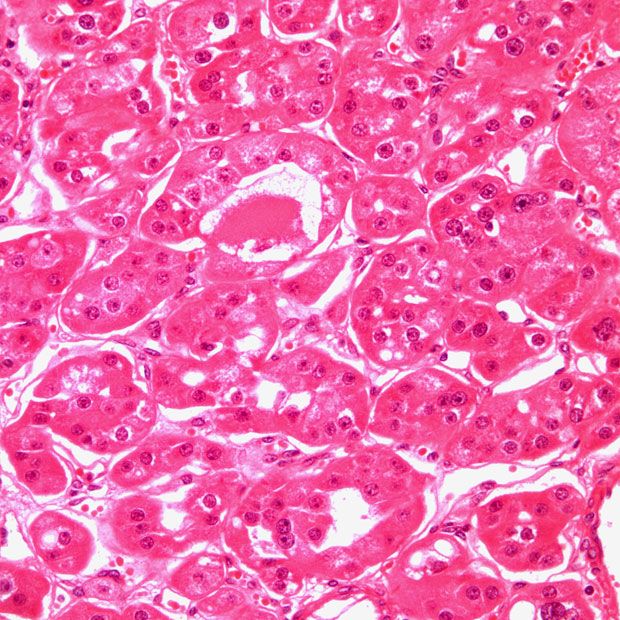Cabozantinib/Atezolizumab Does Not Yield PFS Benefit in Renal Cell Carcinoma
The safety profile seen in the phase 3 CONTACT-03 trial, assessing cabozantinib and atezolizumab in advanced renal cell carcinoma, is consistent with previous findings.
Treatment with cabozantinib (Cabometyx) plus atezolizumab (Tecentriq) did not yield an improvement in progression-free survival (PFS) for patients with previously treated advanced renal cell carcinoma (RCC), according to a press release on findings from the phase 3 CONTACT-03 trial (NCT04338269).1
Detailed results from the phase 3 CONTACT-03 will be shared at a future medical meeting.

CONTACT-03 is comparing cabozantinib/atezolizumab vs cabozantinib alone in patients with locally advanced or metastatic clear cell or non-clear cell RCC that is papillary or unclassified only who experienced disease progression after immune checkpoint inhibitor (ICI) therapy. Thus far, the observed safety profile of the experimental regimen mirrored the known safety profiles for each single agent; investigators identified no new safety signals.
Detailed findings will be released at a future medical meeting.
The multicenter, randomized, open-label phase 3 CONTACT-03 study is evaluating cabozantinib plus atezolizumab vs cabozantinib alone in 522 patients. Patients were randomly assigned 1:1 to receive either intravenous atezolizumab at a dose of 1200 mg every 3 weeks plus oral cabozantinib at 60 mg daily or the cabozantinib backbone.2
The primary end points are PFS according to RECIST v1.1 criteria as assessed by independent radiology review and overall survival. Investigator-assessed PFS, objective response rate, and duration of response are among the key secondary end points along with the incidence of adverse effects.
Population stratification factors include risk group according to International Metastatic RCC Database Consortium (IMDC) criteria, receipt of frontline vs second-line ICI therapy, and disease histology.
Patient crossover from the control arm to the experimental arm is disallowed.
Patients must have a Karnofsky Performance Scale (KPS) score of 70% or greater to be eligible for inclusion. Availability of an archival tumor specimen was another inclusion criterion, as was a fresh biopsy, if clinically feasible. Additionally, patients must have received a PD-1 or PD-L1 inhibitor either as monotherapy or in combination with another agent in their most recent preceding line of treatment.
Exclusion criteria include any prior treatment with cabozantinib or a mechanistic target of rapamycin inhibitor, as well as receipt of more than 1 prior ICI treatment in the locally advanced or metastatic setting. Receipt of more than 2 prior lines of therapy is also grounds for exclusion. Patients with symptomatic, untreated, or progressive central nervous system metastases or another significant intercurrent illness are not eligible.
Cabozantinib is currently approved in the United States for the treatment of advanced RCC, hepatocellular carcinoma among those previously treated with sorafenib (Nexavar), advanced RCC in the first line in combination with nivolumab (Opdivo), and locally advanced or metastatic differentiated thyroid cancer for patients 12 years and older who experienced progression following VEGFR-targeted therapy and who are radioactive iodine–refractory or ineligible.3,4
References
- Exelixis provides update on phase 3 CONTACT-03 trial evaluating cabozantinib in combination with atezolizumab in patients with previously treated advanced kidney cancer. News Release. Exelixis, Inc. March 2, 2023. Accessed March 3, 2023. https://bit.ly/3KUrMw4
- Pal SK, Albiges L, Rodriguez CS, et al. CONTACT-03: randomized, open-label phase III study of atezolizumab plus cabozantinib versus cabozantinib monotherapy following progression on/after immune checkpoint inhibitor (ICI) treatment in patients with advanced/metastatic renal cell carcinoma. J Clin Oncol. 2021;39 (6 Suppl):TPS370. doi:10.1200/JCO.2021.39.6_suppl.TPS370
- Exelixis announces U.S. FDA approval of Cabometyx (cabozantinib) in combination with Opdivo (nivolumab) as a first-line treatment for patients with advanced renal cell carcinoma. News release. Exelixis. January 22, 2021. Accessed March 2, 2023. bit.ly/3YlDLG3
- Exelixis announces U.S. FDA approval of CABOMETYX® (cabozantinib) for patients with previously treated radioactive iodine-refractory differentiated thyroid cancer. News release. Exelixis. September 17, 2021. Accessed March 2, 2023. https://bwnews.pr/2VNSZJw